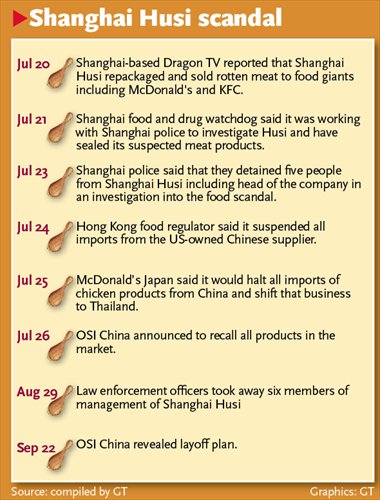HOME >> BUSINESS
Scandal-hit meat supplier plans layoff
By Chu Daye Source:Global Times Published: 2014-9-23 0:03:01
Shanghai Husi unlikely to resume production, says OSI

An officer of Shandong Rizhao Food and Drug Administration shows a carton of seized pork products from Shanghai Husi on July 22. Photo: CFP

US food giant OSI said Monday that it will terminate contracts with 340 employees in China, signaling a shutdown of its Shanghai plant, as the aftermath of the expired meat scandal in July has been "beyond its control."
Experts said the outcome is of no surprise but urged OSI to guarantee employee's rights during the layoff process.
Also on Monday, the Shanghai Municipal Food and Drug Administration held a meeting with the senior executives of OSI Group China, and reiterated that OSI take a certain degree of responsibility for the acts of Shanghai Husi Food Co and that OSI must fully collaborate with the Shanghai regulatory bodies with the ongoing investigation.
On August 29, the Shanghai People's Procuratorate nabbed six Shanghai Husi executives with court warrants stating the suspects may be involved in the production and sale of fake and shoddy products.
"Over the past two months, Shanghai Husi has experienced significant financial and customer losses and the investigations by relevant authorities are still going on," OSI China said in a statement posted on its website on Monday.
"It is very unlikely that production will be resumed soon," the food processor and supplier remarked.
As the "circumstances have went beyond its control," the company will lay off a total of 340 staff, including 226 Shanghai Husi employees and 114 contractors.
"We briefed our layoff plans to the local government and workers' union, and they voiced no objection," a staff from the PR department of Shanghai Husi, who declined to be named, told the Global Time Monday.
Wang Danqing, a partner at Beijing-based ACME Consultancy, said the development is not a surprise.
"The company's brand is tarnished. It has lost its ability to win clients," Wang told the Global Times on Monday.
The incident shows that the issue of food safety is gaining increasing importance in China, and the cost for those companies who cross that thin red line would become dearer and dearer, Wang said.
In recent years, food safety scandals have often hit the headlines in Chinese media.
In 2008, products from domestic baby formula producer Sanlu Group were found to be tainted with melamine and led to the death of six children. The company eventually went bankrupt and the Sanlu brand vanished.
"Apology, minor fine, or just waiting for the storm to be over - these past techniques don't work anymore. Now, companies who meddle with food safety issues will face hefty fines, or simply be kicked out of the market," Wang noted.
In the Monday' statement, OSI said that Shanghai Husi cannot be fully shut down at this stage as a small number of staff would stay to assist with the ongoing investigation.
Qiu Baochang, president of the legal panel at China Consumers' Association, urged labor authority and relevant departments to keep a close watch to ensure Shanghai Husi abide by the Labor Law in the way it handles the layoff.
"As a company, Shanghai Husi has paid its price for breaking the law. As an employer, it should make sure the lawful rights of its employees are guaranteed," Qiu told the Global Times Monday.
Qiu said the innocent employees who had no knowledge of the scandal, and especially those who have been employed for more than 10 years, should be entitled to all the compensation, including social security and other benefits.
Illinois-based OSI supplied products to McDonald's Corp and Yum Brands Inc. China is Yum's biggest market and McDonald's third-largest by outlets, according to a Reuters report.
Yum has fully cut ties with OSI in China. McDonald's published a list of five newly approved meat suppliers, including Shenzhen-based McKey and US-based Hormel, but the list did not include any OSI subsidiaries in China, according to a report by news portal yicai.com on September 2.
Posted in: Companies